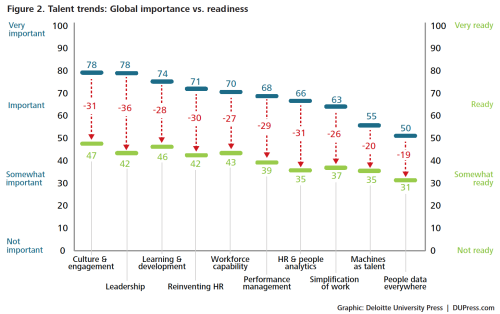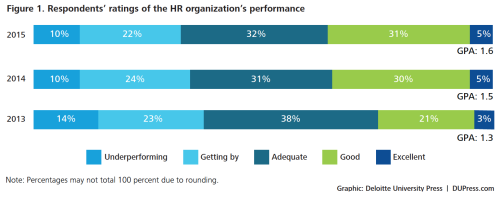 Deloitte recently released its 2015 Global Human Capital Trends report, their annual comprehensive study of HR, leadership, and talent challenges compiled using data from surveys and interviews taken by 3,300+ HR and business leaders in 106 countries around the world. The report identifies 10 major trends that emerged from the most current research, and cites the capability gap (measuring the distance between the importance of an issue and organizations’ readiness to address it) associated with each, as well as practical ideas for how to help organizations combat theses challenges. Ranked by importance, the top ten talent challenges reported for 2015 are: culture and engagement, leadership, learning and development, reinventing HR, workforce on demand, performance management, HR and people analytics, simplification of work, machines as talent, and people data everywhere.
Deloitte recently released its 2015 Global Human Capital Trends report, their annual comprehensive study of HR, leadership, and talent challenges compiled using data from surveys and interviews taken by 3,300+ HR and business leaders in 106 countries around the world. The report identifies 10 major trends that emerged from the most current research, and cites the capability gap (measuring the distance between the importance of an issue and organizations’ readiness to address it) associated with each, as well as practical ideas for how to help organizations combat theses challenges. Ranked by importance, the top ten talent challenges reported for 2015 are: culture and engagement, leadership, learning and development, reinventing HR, workforce on demand, performance management, HR and people analytics, simplification of work, machines as talent, and people data everywhere.
Deloitte’s data highlight considerable gaps in capability among all 10 trends, with the majority of capability gaps getting larger compared to last year.  Let’s take a look at the top five talent issues for 2015: Culture and Engagement ranked as the #1 issue overall for 2015 (not a surprise to us at Great Place to Work®), barely edging out leadership, which ranked as the #1 issue in 2014. This highlights organizations’ recognition that understanding their culture and focusing on building great cultures is a critical need in the face of a potential retention and engagement crisis. Building Leadership ranks as the #2 talent issue for 2015, with close to 9 out of 10 respondents citing the issue as “important” or “very important.” Despite this, Deloitte’s data show that organizations have made very little progress towards meeting this challenge since last year. Learning and Development jumped to the #3 talent challenge in 2015, up from the #8 spot last year. And while the number of companies rating learning and development as important has tripled since 2014, the readiness to address it has actually gone down (!?). Reskilling HR came in as the 4th most important talent issue for the year, with business leaders rating HR’s performance 20% lower than HR leaders’ ranking (and that is with both HR and business leaders ranking HR performance as low on average). Workforce on Demand was the #5 talent challenge for 2015, with 8 out of 10 respondents citing workforce capability as “important” or “very important” in the year ahead.
Let’s take a look at the top five talent issues for 2015: Culture and Engagement ranked as the #1 issue overall for 2015 (not a surprise to us at Great Place to Work®), barely edging out leadership, which ranked as the #1 issue in 2014. This highlights organizations’ recognition that understanding their culture and focusing on building great cultures is a critical need in the face of a potential retention and engagement crisis. Building Leadership ranks as the #2 talent issue for 2015, with close to 9 out of 10 respondents citing the issue as “important” or “very important.” Despite this, Deloitte’s data show that organizations have made very little progress towards meeting this challenge since last year. Learning and Development jumped to the #3 talent challenge in 2015, up from the #8 spot last year. And while the number of companies rating learning and development as important has tripled since 2014, the readiness to address it has actually gone down (!?). Reskilling HR came in as the 4th most important talent issue for the year, with business leaders rating HR’s performance 20% lower than HR leaders’ ranking (and that is with both HR and business leaders ranking HR performance as low on average). Workforce on Demand was the #5 talent challenge for 2015, with 8 out of 10 respondents citing workforce capability as “important” or “very important” in the year ahead.
Through data analysis and extensive conversations with organizations around the world about these challenges, Deloitte arrived at six key findings that give us a bird’s eye view of how organizations are approaching talent and work:
- “ ‘Softer’ areas such as culture and engagement, leadership, and development have become urgent priorities.”
- “Leadership and learning have dramatically increased in importance, but the capability gap is widening.”
- “HR organizations and HR skills are not keeping up with business needs.”
- “HR technology systems are a growing market, but their promise may be largely unfulfilled.”
- “Talent and people analytics are a high priority and a tremendous opportunity, but progress is slow.”
- “Simplification is an emerging theme; HR is part of the problem.”
Each chapter in Deloitte’s report takes a deep dive view into the 10 talent trends they uncovered through their research with some interested findings. For example (in looking at the #4 trend, reskilling HR) Deloitte notes that nearly 40% of new CHRO’s now come from business, not from HR. Why are CEOs bringing in non-HR professionals to fill the role of CHRO? The answer may lie in their sinking belief in HR’s capabilities and abilities to provide solutions to people-related business problems.
Deloitte puts it bluntly: right now HR is just not keeping up with the pace of business, and a reskilling of HR professionals while reinventing the role of HR is becoming critical. This need however, also creates an unprecedented opportunity for HR to play a big role at the highest levels of business strategy. But where do organizations start? Deloitte offers the following advice:
- “Redesign HR with a focus on consulting and service delivery, not just efficiency of administration. HR business partners must become trusted business advisors with the requisite skills to analyze, consult, and resolve critical business issues.”
- “Rather than locating HR specialists in central teams, embed them into the business—but coordinate them by building a strong network of expertise. Recruitment, development, employee relations, and coaching are all strategic programs that should be centrally coordinated but locally implemented.”
- “Make HR a talent and leadership magnet… Create rigorous assessments for top HR staff and rotate high performers from the business into HR to create a magnet for strong leaders.”
- “Invest in HR development and skills as if the business depended on it… Focus on capabilities such as business acumen, consulting and project management skills, organizational design and change, and HR analytical skills.”
There are very useful insights in this report – as there are every year. But this year the insights also serve as a warning to HR. A warning that it’s losing the confidence of CEOs and other C-Suite executives. That 40% of all CHROs are coming from functions other than HR should be sobering. That the top capability gaps are growing larger, not smaller, should be cause for concern. Without bringing furniture into the conversation, this report is a credible and important HR wake up call!





Google Associate Network Blog – News, views and product information for Google member network marketers and publishers.
I believe it depends where you are. There are organizations which are ready and responded to the wake up call many years ago, but there are still many which didn’t. I am in HR now 30 years and passed a handful of companies in this time and must say that the majority haven’t woken up yet and for these I would recommend this article. One comment though, if the last graph in the article is correct then something must be wrong as it shows that HR did make progress from 2013 to 2015, or have I lost my eyesight after 30 years?
Pingback: Top Leadership Development Blog Posts this Week: 3/20/15
Good report for sure. Wake up call. I don’t think so. Good reminder that the playing field of work is an evolving concept. Readiness versus capability is a funny thing. It always changes. Are we ever “ready”? Those motivated to learn and adapt will always be a step ahead. Become more consultative. Really? 1990s thinking from Ulrich. Distribute knowledge and capability into the business. Nothing to see here. Rotate talent in and thru HR. That should always be the case. But so should this be the case across customer facing roles too. Build HR capability and become more business capable. Yes I recall that wake up call 20 years ago. So in the end the world had changed but in some ways it has not at all. And like Laurie states always remember Deloitte is there to solve the problem. We have twenty of them here at my org. Soon to finish. None to soon.
Pingback: Deloitte’s HR Wake Up Call | Human Resour...
Pingback: Deloitte’s HR Wake Up Call | TalentCircle...
Wait, you know who is keeping pace? Deloitte. Just get them on retainer and it will solve your people-related problems!
How I wish there was more insightful commentary like yours in the world of work, China. I’m on your boat, it’s just that too many HR are still focusing on the spinning wheel, that has been going ever since I studied at / graduated business school. That was over 12 years ago. “That 40% of all CHROs are coming from functions other than HR should be sobering.” How do we get this message out, en masse, without frightening people and importantly, showing HR practitioners how to educate and empower themselves for the future? There ARE answers!